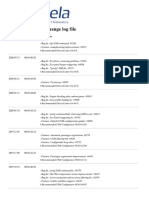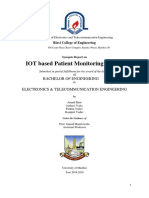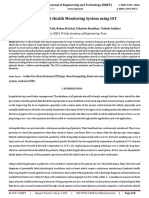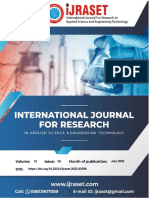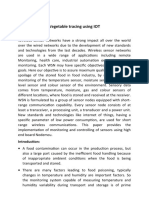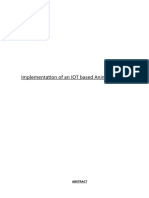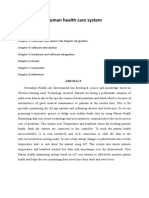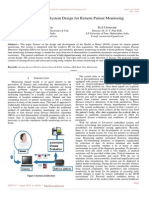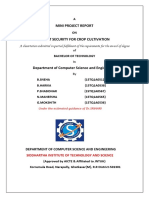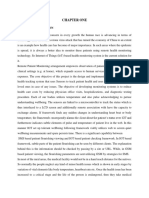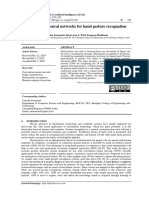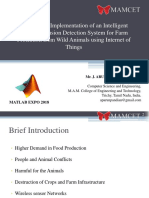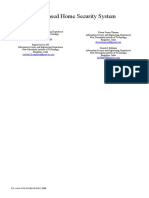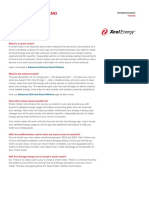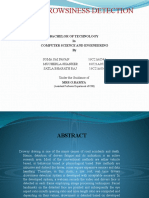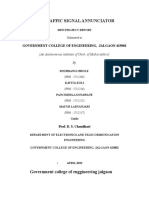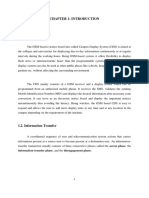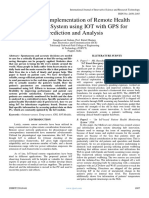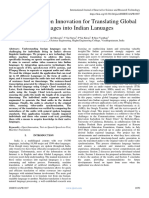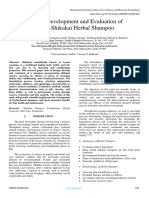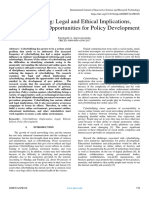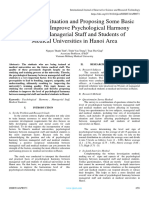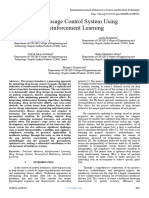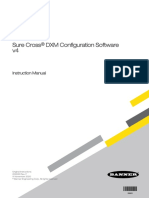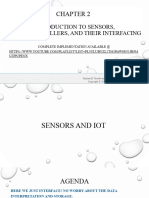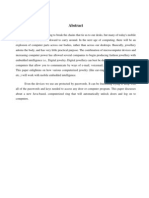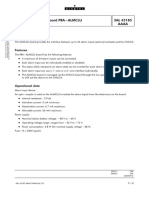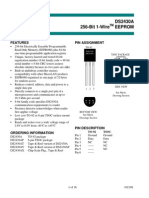Professional Documents
Culture Documents
IOT Based Health Monitoring System
Copyright
Available Formats
Share this document
Did you find this document useful?
Is this content inappropriate?
Report this DocumentCopyright:
Available Formats
IOT Based Health Monitoring System
Copyright:
Available Formats
Volume 7, Issue 10, October – 2022 International Journal of Innovative Science and Research Technology
ISSN No:-2456-2165
IOT Based Health Monitoring System
Dr. C. S. patil (Authour) Vrushali Subhash Sonvane (Authour)
Shri. Gulabrao Deokar College of Engineering, Shri. Gulabrao Deokar College of Engineering,
North Maharashtra University, Jalgaon North Maharashtra University, Jalgaon
Abstract:- So we propose an innovative system that computer using a USB (Universal Serial Bus) that sends data
automated this task with ease. Our system puts forward to the device. Circuit was designed on an online circuit
a smart patient health tracking system that uses Sensors designing app called PCB creator.
to track patient health and uses internet to inform their
loved ones in case of any issues. Our system uses B. Proposed of System
temperature as well as heartbeat sensing to keep track of The core objective of this project is the design and
patient health. The sensors are connected to a implementation of a smart patient health tracking system.
microcontroller to track the status which is in turn Fig.1 shows the overview of the proposed system. The
interfaced to an LCD display as well as wifi connection sensors are embedded on the patient body to sense the
in order to transmit alerts. If system detects any abrupt temperature and heartbeat of the patient. Two more sensors
changes in patient heartbeat or body temperature. Also are place at home to sense the humidity and the temperature
system gives graphical representation of Patient’s of the room where the patient is staying. These sensors are
“ECG". The system automatically alerts the user about connected to a control unit, which calculates the values of all
the patient’s status over IOT and also shows details of the four sensors. These calculated values are then
heartbeat and temperature of patient live over the transmitted/ugh a IoT cloud to the base station. From the base
internet. station the values are then accessed by the doctor at any other
location. Thus based on the temperature and heart beat values
Keywords:- IOT Wi-Fi, Microcontroller, LCD, Voltage and the room sensor values, the doctor can decide the state of
Booster. the patient and appropriate measures can be taken. Sensors
The temperature sensor connected to the analog pin of the
I. INTRODUCTION arduino controller is converted into digital value with the help
of ADC.
Health is always a major concern in every growth the
human race is advancing in terms of technology. Like the III. WORKING PRINCIPLE OF SYSTEM
recent corona virus attack that has ruined the economy of
China to an extent is an example how health care has become The body temperature, humidity and pulse rate sensors
of major importance. In such areas where the epidemic is are monitored and initially displayed on LCD. The values
spread, it is always a better idea to monitor these patients from the sensors especially the body temperature sensor and
using remote health monitoring technology. So Internet of the pulse rate sensor is stored in the database.
Things (IoT) based health monitoring system is the current
solution for it.. The core objective of this project is the design
and implementation of a smart patient health tracking system
that uses Sensors to track patient health and uses internet to
inform their loved ones in case of any issues.While, in GSM
based patient viewing, the flourishing parameters are sent
utilizing GSM by strategies for SMS.
II. THEORY
A. Working Principle of ESP12E
We used the ESP12E as the microcontroller embedded
with Wi-Fi, and the sensors are MAX30100 (pulse rate and
SPo2 measurement sensor) and DS18b20 digital sensor (body
temperature measurement sensor). And there are more
components we are using, such as mobile application, serial
display/plotter and LCD display. All the needed components
for the health monitoring system are described in Figure 2 is
the circuit diagram for the system. An ESP12E
microcontroller, two sensors (MAX30100 and DS18b20), a Fig 1:- Module
16 × 2 I2C LCD display make up the circuit whole system is
powered by 3.3V & 5V. Microcontroller is connected to the
IJISRT22OCT991 www.ijisrt.com 1682
Volume 7, Issue 10, October – 2022 International Journal of Innovative Science and Research Technology
ISSN No:-2456-2165
We used the ESP12E as the microcontroller embedded microcontroller, two sensors (MAX30100 and DS18b20), a
with Wi-Fi, and the sensors are MAX30100 (pulse rate and 16 × 2 I2C LCD display make up the circuit whole system is
SPo2 measurement sensor) and DS18b20 digital sensor (body powered by 3.3V & 5V. Microcontroller is connected to the
temperature measurement sensor). And there are more computer using a USB (Universal Serial Bus) that sends data
components we are using, such as mobile application, serial to the device.
display/plotter and LCD display. An ESP12E
Fig 2:- Flow Chart
IV. CONCLUSION [5]. J. Wan, M. A. A. H. Al-awlaqi, M. S. Li, M. O. Grady,
Communications and Networking, vol. 298, pp. 1–10,
Design and implementation of a health monitoring 2018
system using IoT are presented in this study. is IoT-based
device allows users to determine their health parameters,
which could help regulate their health over time. Eventually,
the patients could seek medical assistance if the need arises.
could easily share their health parameter data instantly within
one application with the doctor. As we know, the IoT is now
considered one of the most desirable solutions in health
monitoring. It makes sure that the parameter data is secured
inside the cloud, and the most important thing is that any
doctor can monitor the health of any patient at any distance.
REFERENCES
[1]. A. Sharma, A. K. Sing, K. Saxena, and M. A. Bansal,
“Smart health monitoring system using IoT,”
International Journal for Research in Applied Science
and Engineering Technology, vol. 8, no. 5, pp. 654–
658, 2020.
[2]. M. MacGill, “What should my heart rate be?,” 2021,
[3]. Minnesota Department of Health, “Pulse oximetry and
COVID-19,” 2020,
[4]. N. S. M Hadis, M. N. Amirnazarullah, M. M. Jafri, and
S. Abdullah, Journal of Physics: Conference Series,
vol. 1535, pp. 1– 12, Article ID 012004, 2020.
IJISRT22OCT991 www.ijisrt.com 1683
You might also like
- GV350M Series User Manual: EGPRS/LTE Cat-M1/LTE Cat-NB1/GNSS TrackerDocument18 pagesGV350M Series User Manual: EGPRS/LTE Cat-M1/LTE Cat-NB1/GNSS TrackerNahuelNo ratings yet
- FM-Eco4 Product Change Log File: Date Firmware DescriptionDocument13 pagesFM-Eco4 Product Change Log File: Date Firmware DescriptionCarlosNo ratings yet
- 11-06-2022-1654946434-6-.-6. ENGG - AN IOT BASED HEALTH MONITORING SYSTEM (ECG, TEMPERATURE, HEARTBEAT, SKIN & SpO2) PDFDocument10 pages11-06-2022-1654946434-6-.-6. ENGG - AN IOT BASED HEALTH MONITORING SYSTEM (ECG, TEMPERATURE, HEARTBEAT, SKIN & SpO2) PDFImpact JournalsNo ratings yet
- IOT Based Patient Health Monitoring SystemDocument6 pagesIOT Based Patient Health Monitoring SystemIJRASETPublicationsNo ratings yet
- Iot Based Health Monitoring SystemDocument13 pagesIot Based Health Monitoring SystemSamuelNo ratings yet
- Integrated Health Information ProgrammeDocument76 pagesIntegrated Health Information Programmesandra fernandezNo ratings yet
- Iot Based Heart Attack DetectionDocument5 pagesIot Based Heart Attack DetectionKing ToluwalopeNo ratings yet
- Smart Shopping Trolley With Automated Billing Using ArduinoDocument3 pagesSmart Shopping Trolley With Automated Billing Using ArduinoInternational Journal of Innovative Science and Research TechnologyNo ratings yet
- IOT Based Patient Monitoring System: Bachelor of EngineeringDocument21 pagesIOT Based Patient Monitoring System: Bachelor of EngineeringImran KhanNo ratings yet
- IOT Based Smart Health Care SystemDocument5 pagesIOT Based Smart Health Care SystemgauthamiNo ratings yet
- Patient Health Monitoring System Using IOTDocument4 pagesPatient Health Monitoring System Using IOTAnonymous CUPykm6DZNo ratings yet
- Smart Medication DispenserDocument5 pagesSmart Medication DispenserRegine OmboyNo ratings yet
- IoT Based Patient MonitoringDocument5 pagesIoT Based Patient MonitoringEditor IJTSRDNo ratings yet
- IoT BASED PATIENT HEALTH MONITORING SYSTEMDocument13 pagesIoT BASED PATIENT HEALTH MONITORING SYSTEMAman Sharma100% (1)
- Title:-Iot Based Health Monitoring System Using Raspberry PiDocument28 pagesTitle:-Iot Based Health Monitoring System Using Raspberry PiGagan DeepNo ratings yet
- Smart Trolley SystemDocument10 pagesSmart Trolley SystemIJRASETPublicationsNo ratings yet
- Smart Walking Stick For The Visually Challenged and GSM To Send MessageDocument8 pagesSmart Walking Stick For The Visually Challenged and GSM To Send MessageKB Praveen KumarNo ratings yet
- Wireless Biomedical Parameters Using Arm9Document8 pagesWireless Biomedical Parameters Using Arm919501A0475 NALLIBOYINA RAJESHNo ratings yet
- Mitali Child SafetyDocument23 pagesMitali Child SafetyVishal LabdeNo ratings yet
- Smart Shopping Trolley and Notification System Based On IoTDocument9 pagesSmart Shopping Trolley and Notification System Based On IoTIJRASETPublicationsNo ratings yet
- Vegetable Tracing Using IOTDocument64 pagesVegetable Tracing Using IOTSampath TNo ratings yet
- Implementation of An IOT Based Animal Care System ReportDocument25 pagesImplementation of An IOT Based Animal Care System ReportAkshay bypNo ratings yet
- Palm vein Technology: A Concise GuideDocument26 pagesPalm vein Technology: A Concise GuideBabjanBittuNo ratings yet
- Smart Animal Health Monitoring SystemDocument8 pagesSmart Animal Health Monitoring Systemchaitanya chaitanyaNo ratings yet
- The Medical MirrorDocument15 pagesThe Medical Mirrornazibhd786No ratings yet
- Women Safety Device Using GPS and GSM ModemDocument3 pagesWomen Safety Device Using GPS and GSM ModemAnonymous izrFWiQ100% (1)
- Advancement in Patient Monitoring SystemDocument23 pagesAdvancement in Patient Monitoring SystemNawaz Sherif NNo ratings yet
- Human health care system monitoring using IoTDocument28 pagesHuman health care system monitoring using IoTRethumon Baby100% (1)
- IoT in Telemedicine: IoT Based Human Vital Signs Monitoring SystemDocument12 pagesIoT in Telemedicine: IoT Based Human Vital Signs Monitoring SystemInternational Journal of Innovative Science and Research Technology100% (2)
- Drowsiness Detection System Using Machine LearningDocument4 pagesDrowsiness Detection System Using Machine LearningNIET Journal of Engineering & Technology(NIETJET)No ratings yet
- Minor Project Report 1Document26 pagesMinor Project Report 1Shanid PrasadNo ratings yet
- Chapter-1: IOT Based Patient Parameter Monitoring System Using Raspberry PiDocument67 pagesChapter-1: IOT Based Patient Parameter Monitoring System Using Raspberry Pipunna pushpakNo ratings yet
- Health at Home System Design For Remote Patient MonitoringDocument4 pagesHealth at Home System Design For Remote Patient MonitoringEditor IJRITCCNo ratings yet
- Visually Impaired People Monitoring in A Smart Home Using Electronic White CaneDocument10 pagesVisually Impaired People Monitoring in A Smart Home Using Electronic White CaneAnonymous Gl4IRRjzNNo ratings yet
- Final Project ReportDocument76 pagesFinal Project ReportMr. KarkiNo ratings yet
- Improvement and Enhancement of Emergency Medical ServiceDocument16 pagesImprovement and Enhancement of Emergency Medical Servicekavitha k s50% (2)
- Athlete Management SystemDocument5 pagesAthlete Management SystemAswinNo ratings yet
- Electronic Voating MachineDocument10 pagesElectronic Voating MachinerishabhNo ratings yet
- Rfid TTL Em18Document2 pagesRfid TTL Em18El-Sayed AhmedNo ratings yet
- Mini Project Report: A Dissertation Submitted in Partial Fulfilment of The Requirements For The Award of Degree ofDocument38 pagesMini Project Report: A Dissertation Submitted in Partial Fulfilment of The Requirements For The Award of Degree ofS R I K A N T HNo ratings yet
- Iot Based Health Monitoring SystemDocument12 pagesIot Based Health Monitoring SystemSamuel100% (1)
- Convolution Neural Networks For Hand Gesture RecognationDocument5 pagesConvolution Neural Networks For Hand Gesture RecognationIAES IJAINo ratings yet
- EAgrobot - Plant Disease Detection and Precision Spraying Robot Using Image ProcessingDocument7 pagesEAgrobot - Plant Disease Detection and Precision Spraying Robot Using Image ProcessingIJRASETPublicationsNo ratings yet
- Arduino Heartbeat Monitoring SystemDocument49 pagesArduino Heartbeat Monitoring SystemPranav Chaturvedi100% (1)
- Design and Implementation of an Intelligent Animal Intrusion Detection System Using IoTDocument17 pagesDesign and Implementation of an Intelligent Animal Intrusion Detection System Using IoTYash ChNo ratings yet
- Pavi ppt-1Document21 pagesPavi ppt-1Priya KabirNo ratings yet
- Patient Monitoring System Using GSM For Hospitals and Old Age HomesDocument5 pagesPatient Monitoring System Using GSM For Hospitals and Old Age Homesvgmanjunatha100% (1)
- Iot Based Ambulance Tracking With Patient Health Monitoring SystemDocument3 pagesIot Based Ambulance Tracking With Patient Health Monitoring SystemdileeppatraNo ratings yet
- Design of Smart Cane With Integrated Camera Module For Visually Impaired PeopleDocument7 pagesDesign of Smart Cane With Integrated Camera Module For Visually Impaired PeopleIJRASETPublicationsNo ratings yet
- IOT Based Home Security SystemDocument7 pagesIOT Based Home Security SystemS Jagadish PatilNo ratings yet
- Health Monitoring GloveDocument7 pagesHealth Monitoring GloveYashNo ratings yet
- M.Phil Computer Science Biometric System ProjectsDocument3 pagesM.Phil Computer Science Biometric System ProjectskasanproNo ratings yet
- TX Smart Meter FAQDocument4 pagesTX Smart Meter FAQNewsChannel 10No ratings yet
- Plant Disease Detection Using Leaf ImageDocument5 pagesPlant Disease Detection Using Leaf ImageSAIKRISHNA S SEC 2020No ratings yet
- Driver'S Drowsiness Detection System: Bachelor of Technology in Computer Science and Engineering byDocument18 pagesDriver'S Drowsiness Detection System: Bachelor of Technology in Computer Science and Engineering byShanker Yadav0% (1)
- Health Monitoring System Using Raspberry Pi 3Document18 pagesHealth Monitoring System Using Raspberry Pi 3himanta deoriNo ratings yet
- Driver Drowsiness Detection Using SmartphoneDocument11 pagesDriver Drowsiness Detection Using SmartphoneIJRASETPublicationsNo ratings yet
- Traffic Signal Annunciator Alerts DriversDocument32 pagesTraffic Signal Annunciator Alerts DriversJayesh KolheNo ratings yet
- Android Controlled Wildlife Observation RobotDocument83 pagesAndroid Controlled Wildlife Observation RobotdileeppatraNo ratings yet
- Smart Notice BoardDocument42 pagesSmart Notice BoardDhiraj BhattNo ratings yet
- IoT Based Patient Health Monitoring SystemDocument3 pagesIoT Based Patient Health Monitoring SystemInternational Journal of Innovative Science and Research Technology100% (1)
- Design and Implementation of Remote Health Monitoring System Using IOT With GPS For Prediction and AnalysisDocument4 pagesDesign and Implementation of Remote Health Monitoring System Using IOT With GPS For Prediction and AnalysisInternational Journal of Innovative Science and Research TechnologyNo ratings yet
- Diabetic Retinopathy Stage Detection Using CNN and Inception V3Document9 pagesDiabetic Retinopathy Stage Detection Using CNN and Inception V3International Journal of Innovative Science and Research TechnologyNo ratings yet
- Exploring the Molecular Docking Interactions between the Polyherbal Formulation Ibadhychooranam and Human Aldose Reductase Enzyme as a Novel Approach for Investigating its Potential Efficacy in Management of CataractDocument7 pagesExploring the Molecular Docking Interactions between the Polyherbal Formulation Ibadhychooranam and Human Aldose Reductase Enzyme as a Novel Approach for Investigating its Potential Efficacy in Management of CataractInternational Journal of Innovative Science and Research TechnologyNo ratings yet
- Investigating Factors Influencing Employee Absenteeism: A Case Study of Secondary Schools in MuscatDocument16 pagesInvestigating Factors Influencing Employee Absenteeism: A Case Study of Secondary Schools in MuscatInternational Journal of Innovative Science and Research TechnologyNo ratings yet
- An Analysis on Mental Health Issues among IndividualsDocument6 pagesAn Analysis on Mental Health Issues among IndividualsInternational Journal of Innovative Science and Research TechnologyNo ratings yet
- Harnessing Open Innovation for Translating Global Languages into Indian LanuagesDocument7 pagesHarnessing Open Innovation for Translating Global Languages into Indian LanuagesInternational Journal of Innovative Science and Research TechnologyNo ratings yet
- The Utilization of Date Palm (Phoenix dactylifera) Leaf Fiber as a Main Component in Making an Improvised Water FilterDocument11 pagesThe Utilization of Date Palm (Phoenix dactylifera) Leaf Fiber as a Main Component in Making an Improvised Water FilterInternational Journal of Innovative Science and Research TechnologyNo ratings yet
- Advancing Healthcare Predictions: Harnessing Machine Learning for Accurate Health Index PrognosisDocument8 pagesAdvancing Healthcare Predictions: Harnessing Machine Learning for Accurate Health Index PrognosisInternational Journal of Innovative Science and Research TechnologyNo ratings yet
- The Relationship between Teacher Reflective Practice and Students Engagement in the Public Elementary SchoolDocument31 pagesThe Relationship between Teacher Reflective Practice and Students Engagement in the Public Elementary SchoolInternational Journal of Innovative Science and Research TechnologyNo ratings yet
- The Making of Object Recognition Eyeglasses for the Visually Impaired using Image AIDocument6 pagesThe Making of Object Recognition Eyeglasses for the Visually Impaired using Image AIInternational Journal of Innovative Science and Research TechnologyNo ratings yet
- Design, Development and Evaluation of Methi-Shikakai Herbal ShampooDocument8 pagesDesign, Development and Evaluation of Methi-Shikakai Herbal ShampooInternational Journal of Innovative Science and Research Technology100% (3)
- Dense Wavelength Division Multiplexing (DWDM) in IT Networks: A Leap Beyond Synchronous Digital Hierarchy (SDH)Document2 pagesDense Wavelength Division Multiplexing (DWDM) in IT Networks: A Leap Beyond Synchronous Digital Hierarchy (SDH)International Journal of Innovative Science and Research TechnologyNo ratings yet
- Terracing as an Old-Style Scheme of Soil Water Preservation in Djingliya-Mandara Mountains- CameroonDocument14 pagesTerracing as an Old-Style Scheme of Soil Water Preservation in Djingliya-Mandara Mountains- CameroonInternational Journal of Innovative Science and Research TechnologyNo ratings yet
- The Impact of Digital Marketing Dimensions on Customer SatisfactionDocument6 pagesThe Impact of Digital Marketing Dimensions on Customer SatisfactionInternational Journal of Innovative Science and Research TechnologyNo ratings yet
- Formulation and Evaluation of Poly Herbal Body ScrubDocument6 pagesFormulation and Evaluation of Poly Herbal Body ScrubInternational Journal of Innovative Science and Research TechnologyNo ratings yet
- Electro-Optics Properties of Intact Cocoa Beans based on Near Infrared TechnologyDocument7 pagesElectro-Optics Properties of Intact Cocoa Beans based on Near Infrared TechnologyInternational Journal of Innovative Science and Research TechnologyNo ratings yet
- Comparatively Design and Analyze Elevated Rectangular Water Reservoir with and without Bracing for Different Stagging HeightDocument4 pagesComparatively Design and Analyze Elevated Rectangular Water Reservoir with and without Bracing for Different Stagging HeightInternational Journal of Innovative Science and Research TechnologyNo ratings yet
- Auto Encoder Driven Hybrid Pipelines for Image Deblurring using NAFNETDocument6 pagesAuto Encoder Driven Hybrid Pipelines for Image Deblurring using NAFNETInternational Journal of Innovative Science and Research TechnologyNo ratings yet
- Review of Biomechanics in Footwear Design and Development: An Exploration of Key Concepts and InnovationsDocument5 pagesReview of Biomechanics in Footwear Design and Development: An Exploration of Key Concepts and InnovationsInternational Journal of Innovative Science and Research TechnologyNo ratings yet
- A Survey of the Plastic Waste used in Paving BlocksDocument4 pagesA Survey of the Plastic Waste used in Paving BlocksInternational Journal of Innovative Science and Research TechnologyNo ratings yet
- Hepatic Portovenous Gas in a Young MaleDocument2 pagesHepatic Portovenous Gas in a Young MaleInternational Journal of Innovative Science and Research TechnologyNo ratings yet
- Explorning the Role of Machine Learning in Enhancing Cloud SecurityDocument5 pagesExplorning the Role of Machine Learning in Enhancing Cloud SecurityInternational Journal of Innovative Science and Research TechnologyNo ratings yet
- Cyberbullying: Legal and Ethical Implications, Challenges and Opportunities for Policy DevelopmentDocument7 pagesCyberbullying: Legal and Ethical Implications, Challenges and Opportunities for Policy DevelopmentInternational Journal of Innovative Science and Research TechnologyNo ratings yet
- Automatic Power Factor ControllerDocument4 pagesAutomatic Power Factor ControllerInternational Journal of Innovative Science and Research TechnologyNo ratings yet
- Navigating Digitalization: AHP Insights for SMEs' Strategic TransformationDocument11 pagesNavigating Digitalization: AHP Insights for SMEs' Strategic TransformationInternational Journal of Innovative Science and Research TechnologyNo ratings yet
- Studying the Situation and Proposing Some Basic Solutions to Improve Psychological Harmony Between Managerial Staff and Students of Medical Universities in Hanoi AreaDocument5 pagesStudying the Situation and Proposing Some Basic Solutions to Improve Psychological Harmony Between Managerial Staff and Students of Medical Universities in Hanoi AreaInternational Journal of Innovative Science and Research TechnologyNo ratings yet
- Mobile Distractions among Adolescents: Impact on Learning in the Aftermath of COVID-19 in IndiaDocument2 pagesMobile Distractions among Adolescents: Impact on Learning in the Aftermath of COVID-19 in IndiaInternational Journal of Innovative Science and Research TechnologyNo ratings yet
- A Review: Pink Eye Outbreak in IndiaDocument3 pagesA Review: Pink Eye Outbreak in IndiaInternational Journal of Innovative Science and Research TechnologyNo ratings yet
- Drug Dosage Control System Using Reinforcement LearningDocument8 pagesDrug Dosage Control System Using Reinforcement LearningInternational Journal of Innovative Science and Research TechnologyNo ratings yet
- The Effect of Time Variables as Predictors of Senior Secondary School Students' Mathematical Performance Department of Mathematics Education Freetown PolytechnicDocument7 pagesThe Effect of Time Variables as Predictors of Senior Secondary School Students' Mathematical Performance Department of Mathematics Education Freetown PolytechnicInternational Journal of Innovative Science and Research TechnologyNo ratings yet
- Formation of New Technology in Automated Highway System in Peripheral HighwayDocument6 pagesFormation of New Technology in Automated Highway System in Peripheral HighwayInternational Journal of Innovative Science and Research TechnologyNo ratings yet
- 1.manual 1.1 Lite ENG Rev12 19Document11 pages1.manual 1.1 Lite ENG Rev12 19Ding Ching TingNo ratings yet
- Easy Pic 40Document17 pagesEasy Pic 40yo9hnfNo ratings yet
- FM53-EN-version1.04 - TeltonikaDocument2 pagesFM53-EN-version1.04 - TeltonikaPankaj RamoleNo ratings yet
- 1-Wire ® (Protocol) : Company: Dallas Semiconductor/MaximDocument7 pages1-Wire ® (Protocol) : Company: Dallas Semiconductor/MaximProfe001No ratings yet
- DXM Configuration SoftwareDocument103 pagesDXM Configuration SoftwareBurensin5063No ratings yet
- DS18X20 With AVR: ChangelogDocument4 pagesDS18X20 With AVR: ChangelogΛιθοξόος ΈλληνNo ratings yet
- SIMATIC-TOP-connect S7 enDocument4 pagesSIMATIC-TOP-connect S7 enHadi Khajouee NejadNo ratings yet
- Secured Smart Healthcare Monitoring SystemDocument25 pagesSecured Smart Healthcare Monitoring SystemSuhas Kapse64% (11)
- DS18S20 High-Precision 1-Wire Digital Thermometer: Features Pin ConfigurationsDocument23 pagesDS18S20 High-Precision 1-Wire Digital Thermometer: Features Pin Configurationsdusan1962No ratings yet
- Report PDFDocument27 pagesReport PDFEEbusoNo ratings yet
- W 1Document21 pagesW 1archankumarturagaNo ratings yet
- VCM - Troubleshooting - Tot2019Document55 pagesVCM - Troubleshooting - Tot2019jodzmary86No ratings yet
- Chapter 2Document20 pagesChapter 2Aryan dadwalNo ratings yet
- Digital Jewellery DocumentationDocument18 pagesDigital Jewellery DocumentationTeja Tarun100% (2)
- Sentry-4412HV: The Sentry-4412HV Is An Industrial Grade Battery Health Monitoring SystemDocument3 pagesSentry-4412HV: The Sentry-4412HV Is An Industrial Grade Battery Health Monitoring SystemTanveer AhmedNo ratings yet
- REVELPROG IS user manual: Quick start guide for device programmingDocument50 pagesREVELPROG IS user manual: Quick start guide for device programmingAriana ScheiderNo ratings yet
- IntelliTrac U Series User Guide v1 4Document48 pagesIntelliTrac U Series User Guide v1 4oundilahmed100% (1)
- 146 - 3al 43185 Aaaa TnaaaDocument6 pages146 - 3al 43185 Aaaa TnaaaJonatan SoaresNo ratings yet
- Embedded System Components: Module-3Document40 pagesEmbedded System Components: Module-3balajibs203285No ratings yet
- Getting Started With 1 Wire Bus Devices TR15-235Document34 pagesGetting Started With 1 Wire Bus Devices TR15-235BrianNo ratings yet
- ST4310 - Device Manual - 100Document13 pagesST4310 - Device Manual - 100Victoria SantayNo ratings yet
- Ares IV - CentorDocument75 pagesAres IV - CentorDavN912No ratings yet
- Et200sp Di 8x24vdc Ba Manual en-US en-US PDFDocument28 pagesEt200sp Di 8x24vdc Ba Manual en-US en-US PDFHarindra BayuNo ratings yet
- DS2430Document16 pagesDS2430giulian2009No ratings yet
- Grenton Technical WiringDiagrams EN v.3.0.2Document62 pagesGrenton Technical WiringDiagrams EN v.3.0.2Sava TrujaNo ratings yet
- ECO 4+ User Manual v1.4Document21 pagesECO 4+ User Manual v1.4prasetyohardiNo ratings yet
- Java RingDocument22 pagesJava Ringkanthu3No ratings yet
- ESP8266 DHT11 Humidity Temperature Data LoggerDocument6 pagesESP8266 DHT11 Humidity Temperature Data LoggersaravananNo ratings yet

